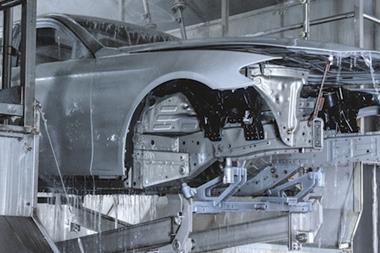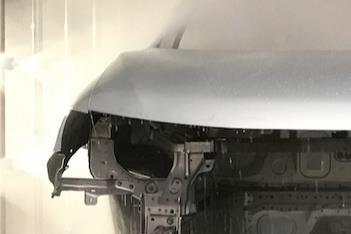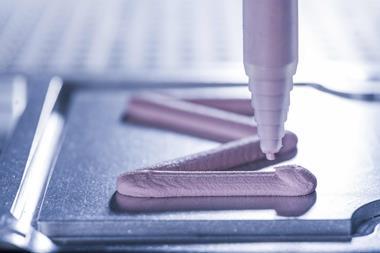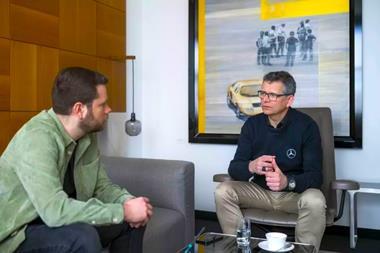 Lightweighting, multi-metal compatibility and a focus on aluminium substrates is how thin-film, pretreatment technologies fulfil the requirements for NIO’s next generation of electric vehicles
Lightweighting, multi-metal compatibility and a focus on aluminium substrates is how thin-film, pretreatment technologies fulfil the requirements for NIO’s next generation of electric vehicles
With its advanced thin-film Oxsilan technology, the Surface Treatment global business unit of BASF’s coatings division operating under the Chemetall brand, ensures a perfect surface treatment and excellent finish for the innovative ES8 from NIO - the multinational electric vehicle company headquartered in Shanghai, China. NIO’s ES8, a seven-seat, high-performance electric SUV, built exclusively for the Chinese market, uses the multi-metal pretreatment process from Chemetall, the technology for which is specifically customised to meet the production requirements of the ES8.
According to a report by Bloomberg New Energy Finance, worldwide sales of electric vehicles and plug-in hybrids will rise to 11m in 2025, compared to 1.1m in 2017, largely driven by strong demand from China. The demand from automotive manufacturers for smart electrified vehicles is increasing while, at the same time, OEMs are focusing on the use of lightweight materials and striving for a greater driving range.
Chemetall, with its long history of innovation and a dedication to process improvement and sustainability, has previously identified two major trends in the automotive market: lightweighting and multi-metal compatibility, with a focus on aluminium substrates. As a result, the company began developing a zinc-phosphating alternative, a zirconium and silane-based pretreatment that became Oxsilan. In terms of quality performance, it is directly comparable to a zinc-phosphate coating: however, in terms of its technical and economic feasibility, the new technology is more advanced. Almost 10m cars on the road today have been treated with this environmentally friendly thin-film pretreatment, and Oxsilan is therefore a proven technology, used globally in over 40 vehicle production lines.
What is Oxsilan?
Chemetall has been able to provide NIO with a tailor-made pretreatment process to match the ES8’s lightweight aluminium body, designed to maximise the vehicle’s driving range, as Oxsilan has been specially adapted for the corrosion protection on NIO’s all-aluminium car bodies. The process gives excellent corrosion protection to the aluminium surface and promotes adhesion for the E-coat, while also offering significant reductions in water consumption, effluent and energy usage, compared to traditional pretreatments.
In the manufacturing process the silanes are hydrolysed and converted to polysiloxanes. During the coating process, the reactive silanol groups are chemically bonded to the metal surface, as well as to the paint coating. Heat treatment, which follows the curing of a subsequent cathodic e-coat, further cross-links the polysiloxanes, creating a coating layer in the range of 100nm, thereby reducing material consumption and pretreatment times, and increasing productivity: improvements of up to 65% have been achieved in some cases.
This thin layer is sufficient to achieve the same degree of corrosion protection as a zinc-phosphate coating, which is 10 times thicker. This benefit has been proven in combination with many paint systems. The numerous functional groups present in the polysiloxanes contribute to the excellent level of paint adhesion achieved. Additionally, Oxsilan offers considerable potential for process optimisation. With the Oxsilan technology, Chemetall has developed a sustainable, efficient and economic pretreatment portfolio that exceeds today’s customer demands and is in complete harmony with current industry trends.
BASF also supplies NIO with tailor-made processes for coatings
Chemetall provides NIO with tailor-made processes to match the specific demands of each of its models. In addition to the Oxsilan pretreatment process, Chemetall is also supplying NIO with the brand new Gardoclean S5166. This cleaning technology is phosphate-free and therefore meets the local legal requirements in China, which include a ban on the use of materials containing phosphates.
Furthermore, BASF has helped to create an unforgettable look with unparalleled performance for the ES8. The SUV uses BASF’s waterborne coatings solutions for all coatings layers.
“As a strategic partner, we collaborated with the NIO design team based in Germany throughout the design and development process for the ES8, as well as during the production development stage in China,” says Nils Lessmann, vice-president and general manager of BASF Shanghai Coatings Co. Ltd. “Our global key account team structure enabled design support to be given directly by BASF’s Automotive Color Design team in Münster, Germany, followed by the transfer of this jointly developed approach to the local team in China for localisation.”
Investments in China
In order to strengthen its position in China, and to deliver the high level of service and quality solutions that customers to expect from Chemetall, BASF is investing in a state-of-the-art surface treatment site for t
he Chemetall brand in the Dushan Port Economic Development Zone of Pinghu, in Zhejiang province, China.The site – completion of which is planned for 2021 – will house production, warehousing, a state-of-the-art laboratory and administrative offices in an ideal environment for manufacturing development. This investment will strengthen Chemetall’s position in China, enabling it to deliver the high level of service and quality solutions that customers have come to expect. Its location at the Dushan Port Economic Development Zone provides excellent infrastructure for this project.
BASF’s Coatings division has frequently invested in China, especially in Shanghai, to further enhance its proximity to customers in the fastest-growing region for automotive coatings solutions. Examples are the first regional Automotive Application Centre in Asia Pacific, at the BASF Innovation Campus Shanghai, as well as a world-scale production facility that supports the growing Chinese automotive industry.
“We are looking forward to serving our customers in China with outstanding products and services from a state-of-the-art surface treatment site in the Dushan Port Economic Development Zone of Pinghu,” says Jin Hui, general manager Chemetall China. The latest investment positions BASF as an even more complete solution provider for coatings, by adding the surface treatment business operating under the Chemetall brand.
Oxsilan use by OEMs
Oxsilan is today’s thin-film technology of choice and meets the pretreatment requirements of many OEMs. Chemetall was the first company to introduce a multi-metal thin-film technology on the market, long before most of the current developments had taken place. Now, Oxsilan represents a proven alternative, comparable in terms of quality to zinc-phosphating or chromating processes. Almost 10m cars on the road today have been treated with Oxsilan. Oxsilan is a proven technology, with global performance. This thin-film technology clearly shows advancements in terms of higher productivity and multi-metal capability, resulting in considerably lower process costs.




































